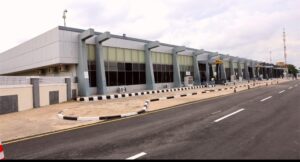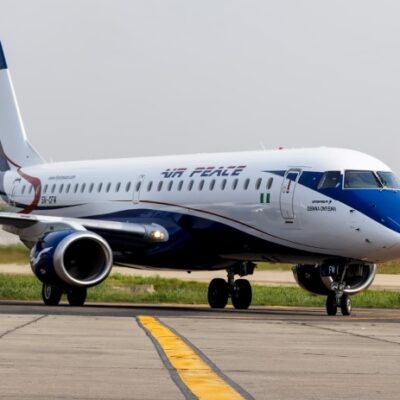BY OLAPEJU OLUBI
The Maiduguri International Airport is undergoing a remarkable transformation that will soon make it one of Nigeria’s most modern regional aviation hubs, linking the country directly with Chad, Cameroon and Niger.
Speaking in an interview, the International Terminal Manager, Ibrahim Bello, described the project as a model of successful collaboration between the Borno State Government, the Federal Airports Authority of Nigeria (FAAN), and the Federal Ministry of Aviation.
According to Bello, the airport’s terminal extension and infrastructural upgrades are now over 90 percent complete.
He credited Borno State Governor, Professor Babagana Zulum, for spearheading the initiative and rallying federal support to bring the long-awaited upgrade to life.
“The infrastructural upgrade, especially the terminal extension, came up when the governor saw the need to collaborate with FAAN and the Aviation Ministry to modernise the airport.
“The Minister of Aviation personally led a team of agency heads, FAAN, NAMA, NCAA, to inspect the facilities. After the visit, a clear plan was drawn up for the comprehensive upgrade, and each agency was assigned its role”, he said.
He explained that while FAAN provided the technical drawings, equipment and manpower, the state government took responsibility for the civil construction.
“Once FAAN submitted the terminal design, the state immediately began work. Today, we’re seeing the results of that partnership,” he noted.

Bello said the new terminal represents a complete shift from the analog systems of the past to a fully digital experience for passengers.
“We have modern digital check-in counters with integrated weighing scales, passenger seating provided by FAAN and new screening machines and conveyor belts already installed,” he revealed.
The upgraded terminal will now hold up to 500 passengers at a time, a significant improvement from its previous capacity of less than 300, making it capable of handling multiple flights simultaneously without any operational strain.
The terminal manager described Maiduguri’s location as one of the airport’s biggest advantages.
“Maiduguri is the only Nigerian city with direct borders to three countries, Chad, Cameroon, and Niger. That gives us a natural strategic edge. This airport can easily evolve into a regional hub, connecting West and Central Africa,” he noted.
Beyond commercial aviation, the airport has become a busy base for humanitarian operations.
Bello revealed that several international agencies, including the United Nations Humanitarian Air Services (UNHAS), the World Food Programme, Doctors Without Borders, and the International Committee of the Red Cross (ICRC), regularly operate non-commercial flights from Maiduguri.
“We record up to five helicopter movements daily. There’s a lot of aviation activity here,” he added.
He confirmed that discussions are ongoing with some local airlines to commence regional operations from Maiduguri to N’Djamena, Yaoundé, and Niamey.
“One of our operators has already done its route analysis and shown interest. It’s a revival of the ancient Trans-Saharan trade route, only now through the skies instead of by camel caravans,” Bello stated.
The airport also serves as a vital hub during the annual Hajj operations, handling pilgrims from both Borno and Yobe states.
“We have successfully managed Hajj and domestic operations from the same terminal due to the military’s occupation of the Hajj terminal. It was challenging, but FAAN’s support made it seamless,” he explained.
On cargo operations, Bello highlighted immense opportunities for economic growth. “There’s huge cargo traffic here in livestock and agricultural produce. We’ve been engaging the Ministry of Livestock and investors to explore this potential,” he said.
“Maiduguri and its neighbouring states, Yobe, Gombe, and Bauchi have rich agricultural outputs that can feed the cargo market.”
He also assured that the airport remains one of the most secure in Nigeria.
“We have layered security here, the Air Force, the Strike Group, and other agencies provide strong protection. We have no security concerns at all,” he stated confidently.
Bello said the runway, though old, has been well maintained and remains in excellent condition. “It’s not just looking good; it’s performing excellently,” he said. “FAAN has been consistent in supporting us to ensure it remains top-class.”
As the airport prepares to begin international and regional operations, Bello expressed optimism about passenger turnout.
“Our route analysis shows strong demand. Many people currently travel by road to Chad and Cameroon, but once flights become available, they’ll switch to air travel. Even smaller aircraft like Embraer or Bombardier jets can operate profitably here,” he said.
In his words, Maiduguri’s new aviation story is one of transformation and hope.
“This airport is rising from a symbol of conflict to a beacon of connectivity and progress for the entire region. What we’re building here will open the skies for trade, travel, and development in the Sahel,” he noted.
Olapeju is a journalist and aviation reporter.





